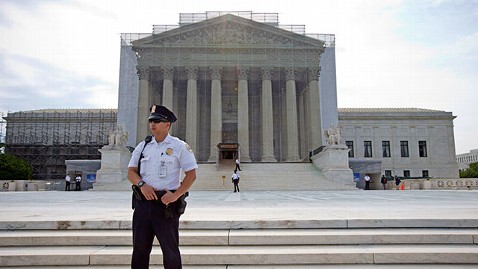Supreme Ct. Rejects Proof of Citizenship for Federal Elections in Ariz.

(Image Credit: J. Scott Applewhite/AP Photo)
The Supreme Court today struck down part of an Arizona law that requires proof of citizenship in order to register to vote in federal elections.
Arizona's Proposition 200 passed in 2004 and required, among other things, any registrant who does not have a driver's license issued after 1996 or a non-operating license to provide documents such as a copy of a birth certificate or a passport. The law went further than a federal law that established a nationally uniform voter application form on which the registrant is required to check a box indicating U.S. citizenship and to sign the form under penalty of perjury.
Justice Antonin Scalia, writing for a 7-2 majority, said today that the state law conflicted with the federal law, the National Voter Registration Act (NVRA), which is sometimes referred to as the Motor Voter law. The NVRA was enacted in 1993 to establish uniform procedures to vote in federal elections.
Scalia said a state-imposed requirement of evidence of citizenship that is not required by the federal form is "inconsistent" with the NVRA's mandate that states accept and use the federal form.
"No matter what procedural hurdles a State's own form imposes, the federal form guarantees that a simple means of registering to vote in federal elections will be available," he wrote.
He said that if Arizona were to prevail, the federal form would cease to perform "any meaningful function" and would be a "feeble means" of increasing the number of eligible citizens who register to vote in elections for federal office.
David Gans of the Washington-based Constitutional Accountability Center, a group opposed to the Arizona law, said, "The court affirmed Congress' decision to use a single federal form to help streamline the voter registration process, and prevent states like Arizona from denying the right of citizens to register to vote in federal elections.
"At a time when states are engaged in voter-suppression efforts, today's opinion is an important reaffirmation that the text and history of the Elections Clause give the federal government broad power to preempt state law in order to protect the right to vote in federal elections."
Arizona's law had been challenged by groups such as the Mexican American Legal Defense and Education Fund (MALDEF), which argued that Proposition 200 put additional burdens on voters
At oral arguments, Patricia A. Millet, a lawyer for the challengers of the law, said Congress designed the federal form to confront a situation in which "40 percent of eligible voters were not registered , because state procedures and burdens were standing as an obstacle, a barrier in the direct line of accountability between individual citizens and their federal government."
Arizona Attorney General Thomas Horne acknowledged today that the court had invalidated the part of the Arizona law that requires proof of citizenship, but pointed out that it left open the possibility that the state could go to the Election Assistance Commission (EAC) - a federal agency set up to handle election issues - and seek a state-specific requirement that people provide evidence of citizenship to register to vote.
Horne said that after consulting with the Secretary of State of Arizona, he hopes to seek relief immediately from the EAC.
"I would have rather gotten victory right away," Horne said, "but the court has shown us a pathway to eventual victory."
A lower court had already struck down the law. "We recognize Arizona's concern about fraudulent registration," the majority wrote in 2011. "Nevertheless, the Elections Clause gives Congress the last word on how this concern will be addressed in the context of federal elections."
ABC News' Josh Hafenbrack contributed to this report.